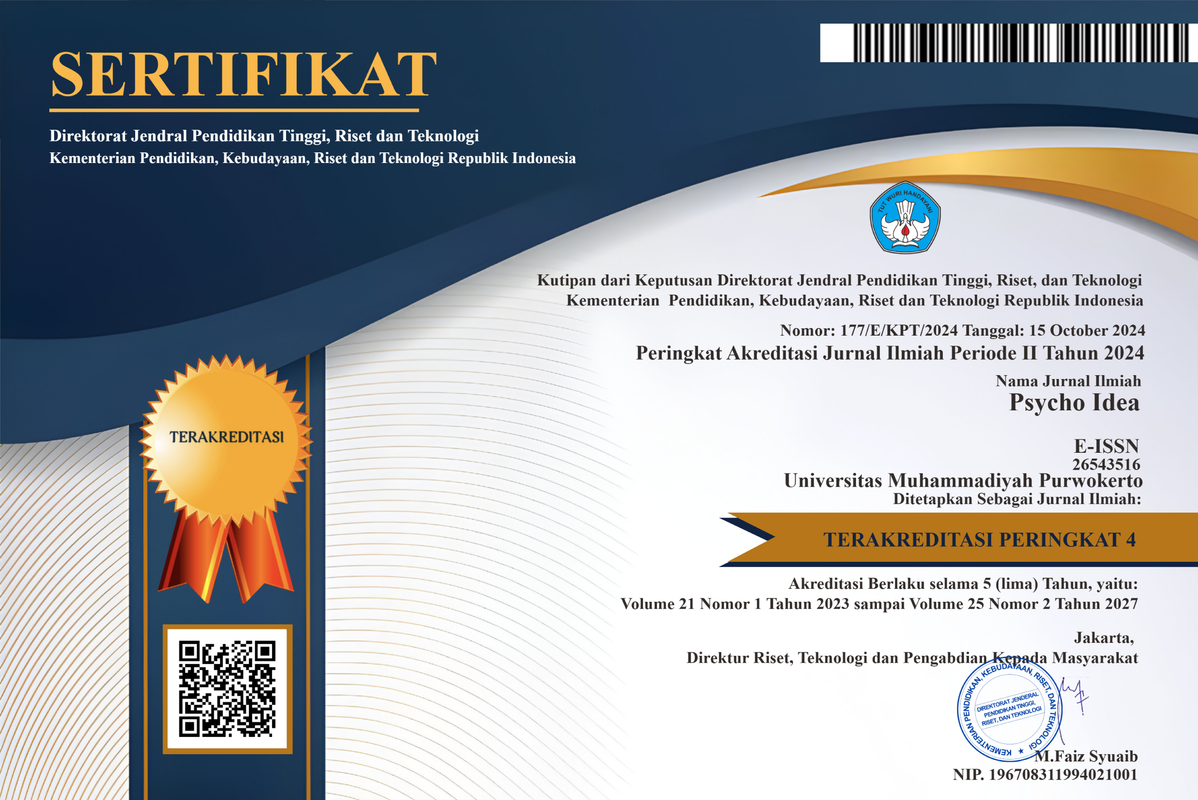IDENTIFIKASI PERMASALAHAN ANAK USIA DINI BERKEBUTUHAN KHUSUS DAN PENANGANANNYA
DOI:
https://doi.org/10.30595/psychoidea.v13i1.1554Abstract
Penelitian ini bertujuan untuk mengidentifikasi ada tidaknya anak berkebutuhan khusus di sekolah, jenis permasalahannya, dan mengidentifikasi kualitas penanganan terhadap anak berkebutuhan khusus. Penelitian ini dilaksanakan di tiga Taman Kanak-kanak di Kecamatan Purwokerto Timur Kabupaten Banyumas. Subjek dalam penelitian ini adalah anak didik di TK Aisyiyah 1 Purwokerto sejumlah 110 anak, anak didik di TK Pertiwi Arcawinangun sejumlah 80 anak, anak didik di TK Pertiwi Mersi Purwokerto sejumlah 55 anak. Analisis data dilakukan secara deskriptif, hasil penelitian menunjukkan bahwa : terdapat 2 anak mengalami gangguan pemusatan perhatian dan hiperaktivitas (GPPH) dan 1 anak mengalami gangguan belajar. Kualitas penanganan anak berkebutuhan khusus berada pada kategori kualitas sedang. Kata Kunci : Identifikasi, Anak Berkebutuhan Khusus, Anak Usia DiniReferences
Direktorat PAUD. (2002). Jurnal Ilmiah PAUD Edisi Bulan Oktober. Jakarta : Direktorat PAUD Kementerian Pendidikan dan Kebudayaan Republik Indonesia
Direktortat PAUD. (2004). Konsep Dasar Anak Usia Dini. Jakarta : Direktorat PAUD Kementerian Pendidikan dan Kebudayaan Republik Indonesia
Direktorat PAUD. (2004). Modul Sosialisasi PAUD. Jakarta : Direktorat PAUD Kementerian Pendidikan dan Kebudayaan Republik Indonesia
Cross, A. Traub, E. Hutter Pishgahi, L. (2006). The Universal Design of Early Education : Moving Forward for All Children.Beyond the Journal.http://journal.naeyc.org/btj/200609/ConnPowersBTJ.pdf
Doctoroff, S. (2001). Adapting The Physical Environment to Meet The Needs of All Young Children for Play. Early Childhood Education Journal, 29 (2) : 105-109
Dwinita, D. (2012). Pelaksanaan Bimbingan Konseling Anak Berkebutuhan Khusus. Jurnal Ilmiah Pendidikan Khusus, 1, ( 3).
Flynn, L.L. Kieff. J. (2002). Including Everyone in Outdoor Play. Young Children 57 (3) : 20-26
Hallahan, D. P & Kauffman, J. M. (1988). Exeptional Children. New Jersey: Prentice Hall
Hurlock, E.B. (1997). Psikologi Perkembangan. Suatu Pendekatan sepanjang Rentang Kehidupan. Jakarta: Penerbit Erlangga.
Koentjaraningrat. (1993). Metode-metode Penelitian Masyarakat. Jakarta :PT. Gramedia.
Munandar, U. (2009). Pengembangan kreativitas anak berbakat.Jakarta: PT. Rineka Cipta
Smith, D. (2003). Inclusion Schools for All Students.An International Thomson Publishing Company.
Suryabrata, S. (1992). Metodologi Penelitian. Jakarta: CV. Rajawali Pers.
UNESCO, (2000).Education For All: Meeting Our Collective Commitments. The World Education Forum, Dakar, Senegal, 26-28 April 2000. http://www.unesco.org/education/efa/ed_forall/dakframeng.shtml
Downloads
Published
Issue
Section
License
Authors published in this journal agree to the following terms:
- The copyright of each article is retained by the author (s) without restrictions
- The journal allows the author(s) to retain publishing rights without restrictions
- The author grants the journal the first publication rights with the work simultaneously licensed under the Creative Commons Attribution License, allowing others to share the work with an acknowledgment of authorship and the initial publication in this journal.
- Authors may enter into separate additional contractual agreements for the non-exclusive distribution of published journal versions of the work (for example, posting them to institutional repositories or publishing them in a book), with acknowledgment of their initial publication in this journal
- Authors are permitted and encouraged to post their work online (For example in the Institutional Repository or on their website) before and during the submission process, as this can lead to productive exchanges, as well as earlier and larger citations of published work
- Articles and all related material published are distributed under a Creative Commons Attribution-4.0 International Public License (CC - BY 4.0).
License
Psycho Idea is licensed under a Creative Commons Attribution- 4.0 International Public License (CC - BY 4.0).
You are free to :
Share — copy and redistribute the material in any medium or format
Adapt — remix, transform, and build upon the material for any purpose, even commercially











